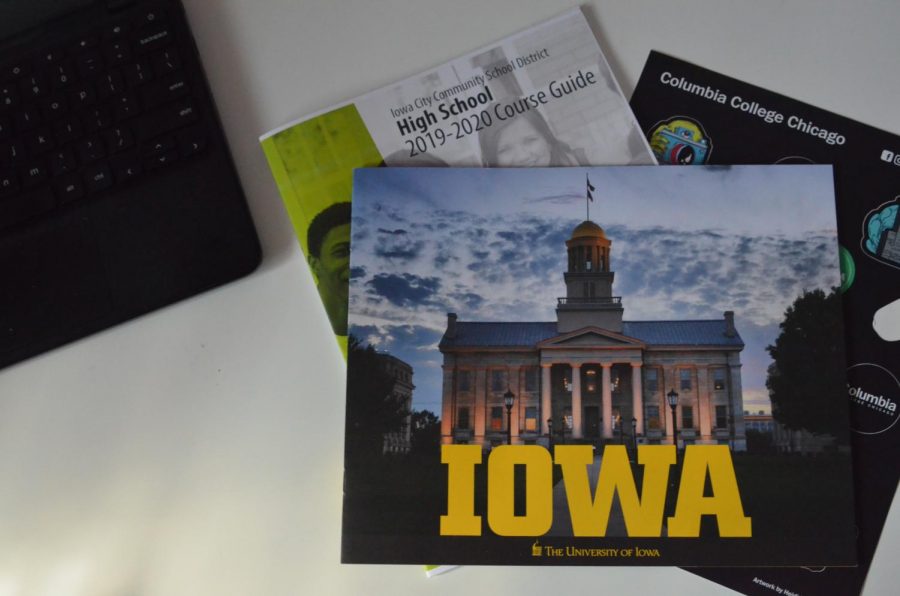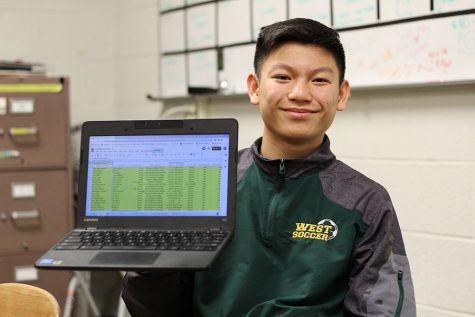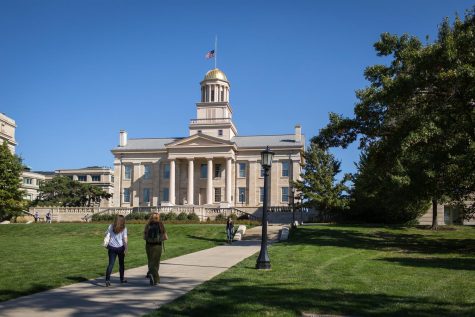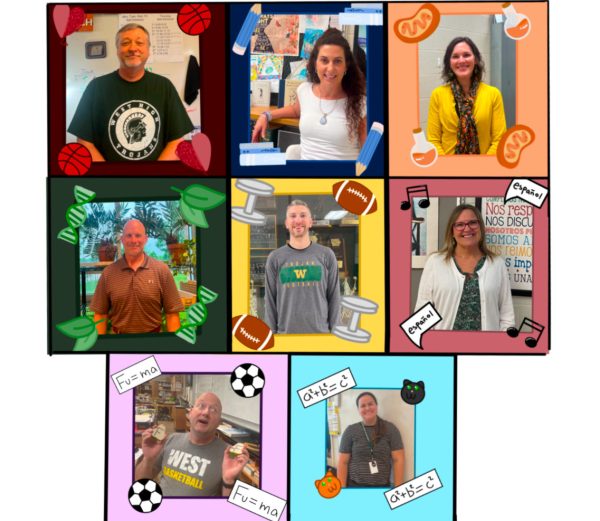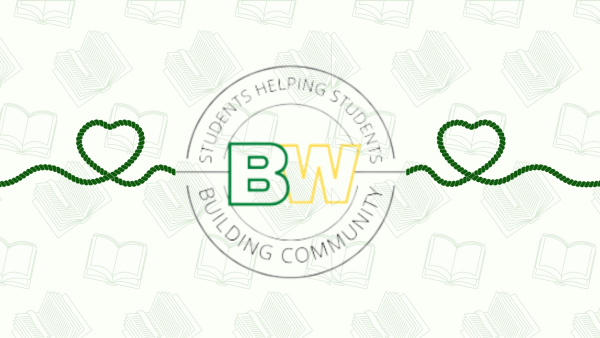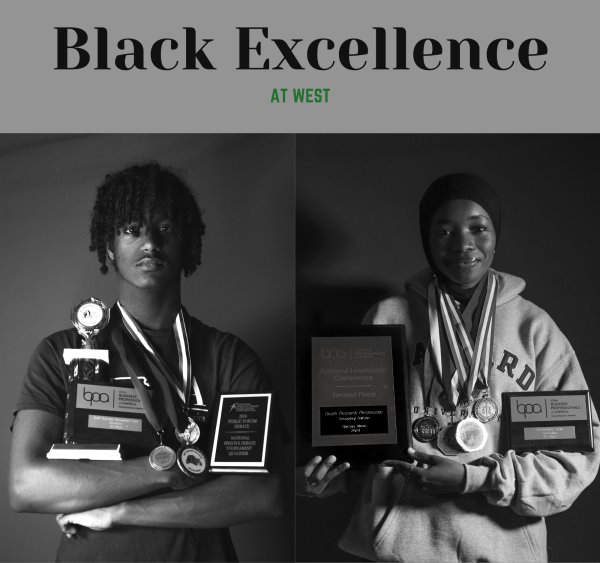College admissions process Q&A
Two Zooms were held in the month of April to ask admissions counselors about the college admissions process. The first panel consisted of counselors from the University of Iowa and Drake University. The second panel consisted of counselors from Drake University, the University of Chicago and Northwestern University. Here are their insights and tips.
How should a student go about finding the right college for them?
Under normal circumstances:
“If you’re going on a road trip with your family, and you’re driving by someplace, go and walk around as much as you can. Getting on a physical campus as much as possible is going to help you get a better idea of what type of institution you’re looking for, and always go and visit multiple types of schools. Go and visit a smaller private liberal arts school and see a larger public institution, go and visit a community college. I think getting on campus and talking to current students is the best way to really figure out what type of fit is going to be best for you and what you’re really looking for.” – Susan Dickinson, Drake University
Under circumstances today:
“Take advantage of what the schools that you’re interested in are offering. [Drake and Iowa] really kind of pivoted to digital space, and obviously that’s not getting to sit on campus seeing the classrooms or anything like that physically but being connected to [counselors] at the schools that you’re looking at.” – Grace Wenzel, Drake University
“I would also note that if you have an interest in schools and perhaps it’s not within your family’s budget to visit like a million places, even just by sending an email or somehow engaging with your admission counselor at some of those institutions demonstrates that the student is really engaged. It could be a really specific question about your application, or you can tell me a little bit more about this particular program at your school. That is something to kind of keep in mind, that not all hope is lost if you can’t actually physically get to a place.” – Anne Kremer, University of Iowa

Will the college admissions process change due to COVID-19? What adjustments do you expect to see?
We try to be as responsive to the situation the students are in as possible.
— Domenic Lamberti, University of Chicago admissions counselor
“I think the universal response [is that] colleges and universities are really going to work with students who are current seniors [and] work with students who are current juniors and sophomores and really give students the benefit of the doubt with everything that’s taking place this semester or this trimester. We all will know what happened spring 2020 with the circumstances that students are under. In many cases, most schools are moving to a pass no pass grading system [and] online instruction. It’s different from school to school, so our message has been, and I think this is the message of every school I’ve talked to, is that we are going to be extremely flexible.” – Kirk Kluver, University of Iowa
“We try to be as responsive to the situation the students are in as possible. For us [there are] changes in the ways that we interact with you. We’re turning all of our information sessions and tours entirely virtual, putting together resources for students [and] continuing to be just more aggressive about the way that we communicate. We know it’s even harder nowadays, you know, so we are trying to find new and innovative ways to connect with you to give you the information that makes you a successful applicant for our schools but also just generally as you go about navigating the college search process. In terms of dates and timings and things, not much has changed at the University of Chicago for our current cycle, nor looking forward to our future cycle, [as we are] already a test optional institution, we don’t necessarily have the same concerns about testing flexibility, but I know that’s something that some other institutions are also considering at this time.” – Domenic Lamberti, University of Chicago
“For the actual application process itself, you’re starting to see some universities around the country definitely starting to reevaluate how they’re going to be approaching their application cycles. I know the UC system, Cornell [and] Williams College on the East Coast have all started to make changes to their testing policies. For a lot of us though, I anticipate that it’s going to be a while before, if we were to make those decisions, to go test optional for this cycle. It will probably be made later this summer, if it were to happen at all. So at this time we’re just kind of proceeding as normal for our application process, All things at this time remain pretty much the same at Northwestern.” – Fritz Burgher, Northwestern University
“So we’ve actually done a few things for our cycle this year. We’ve extended the decision date deadline [and] pushed that back to June just knowing that there are a lot of other factors that are maybe delaying students’ decisions. Similar to the University of Chicago, Drake has a test flexible application process, so that means students are able to opt into an interview with an admission counselor, and that is the way that we process your application. We’ll also look at your transcripts and your reference letters or your activities list or any other kind of pieces that you send us with the application. But we’ve been doing that for the past four or five years now, so that’s kind of already cooked in. The thing that I’m really encouraged by [is that] these offices are really pivoting into this digital space, and it really is kind of connecting us to a population of students that may not have been able to visit campus anyway. And I think that’s the thing too, to kind of, as we’re all kind of adapting to this new normal for the time being, take advantage of these and take advantage of connecting with counselors, even if it’s you know a 20 minute phone call. Whatever the case may be, you should get a sense of the folks that you’ll be working with and kind of making those introductions to help you make the next couple months or a year as you’re doing this college search process as easy as possible because the sooner you can build up the relationships with these counselors in these offices, the better kind of the process will be as you continue on.” – Grace Wenzel, Drake University.
*As of now, the University of Iowa is not test optional

Would students be at a disadvantage if they decided against submitting test scores to colleges?
“I can think of the University of Chicago context, and the answer is no, they don’t have a disadvantage. Last year, we had about the same percentage of students applying without testing as we [did applying with testing] in our final student body for that class, so it doesn’t put a student at a disadvantage. If you’re not submitting testing, the academic preparation piece that we’re going to see is what we hear from your letters of recommendations and what we see on your transcript, so it’s not as a solution for for folks who maybe didn’t do as well in the transcript and are also worried about testing, but it is more so for those students who look at their transcript and are doing very well in their schools, are challenging themselves, and for whatever reason, the testing piece isn’t matching up, whether that’s test anxiety, not having access to testing prep or whatever it may be. If that’s you, you’re not at a disadvantage by not sending those test scores at the University of Chicago.” – Domenic Lamberti, University of Chicago
“We’re a test optional school, which means you can be just as competitive for admission and scholarships. If you’re like, ‘My GPA is this, I’m taking some honors and AP courses [and] I probably would do pretty well in the interview situation,’ you actually might fare better. So I would, you know, keep that peace of mind.” Anne Kremer, Drake University.

What would you like to see on a student’s resume or application?
I always look for depth rather than breadth in a resume.
— Susan Dickinson, University of Iowa admissions counselor
“One thing that I personally really love to see on an applicant’s resume is part time job experience. If you’re taking challenging courses, you’re doing well in them and you’re working five to ten hours a week at Fairway, that’s proof that you are going to do well as a college student because you know how to manage your time. You know how to balance expectations, and you’re able to kind of do well in both of those things, so that’s something that I value very highly on a resume or activities list. Volunteer experience is also good. I like to see volunteer experience that seems like it’s really meaningful to the student, something that maybe connects with what they want to do in their future or a passion that they have. I think for me it is much more meaningful to see a lot of volunteer experience in one particular area rather than just a couple hours scattered over a few other things. I always look for depth rather than breadth in a resume. If you’re really passionate about one activity, and you’re all in on that one thing, that’s okay. I love seeing that students are really dedicating their time to one thing that they’re super passionate about.” – Susan Dickinson, University of Iowa
“If you’re taking care of a family member at home, or if there are other home responsibilities that you carry, that’s really important too. I think colleges just want to know where else you spend your time, and if it’s caring for an elderly family member or your other family members, you’re helping out at home. [That] is okay to put in your application, and schools value that just as much as they value all of the other [activities].” – Anne Kremer, Drake University
“So I think one thing to know, I guess for the University of Chicago, and likely true of both Drake and Northwestern, is that we do review applications holistically which means that when we’re looking at an application, it’s not just one piece that weighs more in our process. Everything that we’re asking you for is something that we care about, so we’re not just looking at your academic preparation, we want to know that you’re going to come to our campuses and be successful in the rigorous programs that we offer, but we’re also looking at your activities list to understand what opportunities you had in your community. Did you take advantage of those? What sort of impact did you make, and are you likely to make on our campuses? So the answer is it’s not always the most cut and dry, but it’s that all those pieces really do matter equally to us.” – Domenic Lamberti, University of Chicago
What are some tips you have when it comes to students writing their essays?
“You need to think as a student about what you want to articulate and how you’re going to do that. What is the story you want to tell about yourself? And then what might you bring to their campus.” – Thomas Paulsen, University of Iowa
“When I was at Northwestern, there was a question about why you want to attend our school. I always felt like the best essays for that were students that could articulate why they truly wanted to go. It’s not about regurgitating all the facts and figures about the school … You want to tell them why you truly feel like this place speaks to you and speaks to your heart and who you are as a person. What is it that that school is offering you, that is specifically attracting you? It could be a faculty member that you met. It could be that your parents went there and the traditions that your family has had around that institution. It could be that you’ve done your research on a particular type of research that’s happening at that institution, and you want to be a part of that. It could be all of those things wrapped into one, but I think it’s really important to think about what it is about that school that speaks to you.” – Anne Kremer, Drake University
“Sometimes I find that students might write an essay about a person that’s influenced [them], and what I ended up reading is like a three pager on how amazing a grandmother was or a mom or a dad or a sibling or a cousin or a teacher. But what is missing is the reflective piece, the ‘this is how this person has influenced my life.’ Tell us the ‘how’, and tell us the ‘why’, don’t just tell us the ‘what’. Try to dig into that and how that has impacted you, shifted you and changed you.” – Anne Kremer, Drake University
“The best essays I read last year were authentic. Sometimes students are humorous because that is the tone of a student, that they’re kind of a comedian. Sometimes you’re very cerebral. And that’s sometimes hard to do, but I think if you sit down and say, rather than try to write something that I think the universities will like or be attracted to, what can I write that’s going to be a reflection of who I really am so they have a good idea of me. And I think that’s easier said than done, but those are the best essays, and I don’t think there’s any tricks to try to be memorable or obscure or anything else than just try to be authentic. Let it really show who you are as an individual.” – Kirk Kluver, University of Iowa
At what point should students ask for teacher recommendations? Who should they ask? How should students approach teachers in this current situation?
“I think it’s okay now for the teachers that you’re close to, to reach out to them remotely is fine, and you should at least start thinking about the people you have relationships with. You can tell them that in this fall you’re going to ask them to write you a letter of recommendation.” – Thomas Paulsen, University of Iowa

Picking a major is nerve wracking. What advice do you have when it comes to making the right choice?
There’s a lot of flexibility, and I definitely think it’s okay for you to not know what you are looking at right now.
— Grace Wenzel, Drake University college admissions counselor
“I think there’s a lot of pressure to find something, and that’s what you’re gonna do, but you can find things that are exciting to you and interesting to you, and all of our universities have different ways to help support students find things that they are excited about and interested in. [When] I was in the journalism school, and I thought I wanted to be a TV reporter and was able to get in front of the camera in my first week or two on campus at Drake, I realized very quickly I did not like my face or my voice enough to do TV for the rest of my life. So I was able to switch to behind the camera. I actually found a second major in English and double majoring was not on my radar going into college at all. I didn’t even declare my second major until the end of my sophomore year so I changed my major in the first three weeks and then added a major almost a year and a half later, so there’s a lot of flexibility, and I definitely think it’s okay for you to not know what you are looking at right now.” – Grace Wenzel, Drake University
“I regret not [changing my major]. So, I was in the camp where I thought that I needed to stick with what I started with after four years, and I had an inkling that it probably wasn’t, so let’s rewind a bit. So I went to Northwestern because I wanted to go into journalism and … I was bound and determined to anchor ‘World News Tonight’ and stuff like that. Well, after about a couple years in this program, I really discovered that I don’t really like the lifestyle of a journalist. I ultimately stayed and finished my time here. But, in hindsight, I wish I would have been a little bit more mature, frankly, in that decision making process and open myself up to being undecided for a while in college and exploring. I didn’t quite know how that would look, and instead of asking for help, I kind of just kept my head down and moved forward to that. So I really encourage you all whether you have a clear idea like you want to go into medicine or you want to go into business or if you’re completely undecided, take as many different classes as you can, especially those first couple of years and explore. I can’t stress that enough to students at your age, especially at this time.” – Fritz Burgher, Northwestern University
“I also wanted to [add] that understanding the curriculum as well as your major [is important] because if you do change that major, you want to understand what the general education looks like and what the approach to education is because there’s a big difference in school to school. Some are going to be liberal arts colleges, some are going to have a more narrowly tailored general education program so understanding what other aspects of education outside of your major will be beneficial because you know at all of our colleges that’s only a portion of your time, and so you’re going to want to understand what else am I going to be learning, whatever tune is or what structures available to me, so that differs a lot at schools.” – Domenic Lamberti, University of Chicago

What resources and tools are out there for students to utilize for financial needs?
There’s a tool, the net price calculator that exists online.
— Fritz Burgher, Northwestern University admissions counselor
“Look at local scholarships in your area so in Iowa City or your neighborhood. Things like Community Credit Union, local banks, rotary clubs, that kind of stuff that you know typically is happening the spring of your senior year, so kind of getting tuned into that. Use this spring to just kind of get an idea of okay like these, these are the tentative deadlines for some of these. That’ll be good to just kind of have on your radar too.” – Grace Wenzel, Drake University
“So at UChicago, as part of our No Barriers program, if you’re applying for need based financial aid we waive your application fee in all of our financial aid packages. You’ll never receive loans, and we do meet 100% of what is known as a student’s demonstrated need. To calculate that we’re basically taking the full cost of attendance, room board tuition, books, everything that goes into being a student at UChicago, we subtract what is known as your expected family contribution, and we’re we left with that demonstrated need, and that is what we at UChicago meet 100% of. Most of our aid is on the need based side, but we do offer merit scholarships as well.” – Domenic Lamberti, University of Chicago
“At Drake it’s kind of a combination of the two. So we have what we call our presidential scholarship. That’s a range that’s based entirely on the application you send us so whether that’s a standard path which is submitting test scores transcripts you know all of those pieces or opting into the test flexible option. The range this year, and it’ll be a little bit different for you all next year, is $20,000 to $23,000, so at minimum by getting accepted into the university based on the application you send us, you’ll be getting somewhere in the range of that presidential scholarship. We also have something at Drake called our tuition guarantee. So, what that means is that your tuition price is locked in for four years, so you’re not digitally playing the guessing game of what tuition might cost year over year at schools because tuition prices tend to go up. What we also have is FAFSA, which I’m sure is mostly familiar language to you all. That is how we award any need based aid.” – Grace Wenzel, Drake University
“So Northwestern only offers need based financial aid. A lot of politics often go into merit based stuff so we’ve kind of determined that it’s best to just try to really diversify campuses as socioeconomically as possible. Obviously, merit based covers a lot of really good stuff too. Just as an institution we’ve decided to allocate our funds that way. There’s a tool, the net price calculator that exists online. It’s a federally mandated tool, through the Department of Education, that all colleges and universities are required to have on their website, and it’s supposed to give you an accurate estimate of what your financial aid package would look like for that specific institution. The degrees to which those estimates are accurate varies widely from institution to institution. But what I would recommend is definitely try to fill that out for the schools that you’re interested in, and then follow up with an admissions rep or the financial aid office at that institution, and they’re going to be able to give you a good answer about whether or not that’s a realistic package, so before you even apply to the school you should have an idea of how much you might be expected to pay if you’re admitted.” – Fritz Burgher, Northwestern University
What do you want students to know about the college admissions process, whether that be during this time or generally?
“You should apply for six to eight college max, otherwise you’re doing yourself a disservice.” – Fritz Burgher, Northwestern University
“I always emphasize that [GPA] isn’t the first place we look. I’m much more looking class by class and seeing what a student has done, if they’ve challenged themselves. We try to understand the context of high school, and we’ll look at the entirety transcript [of the] rather than a couple of pass/fail decisions.” – Domenic Lamberti, University of Chicago
“I know that there’s some stress around grades, around getting that test score and around the coronavirus. The coronavirus, it will pass. If there’s any way you can just take a step back and try to enjoy the process, it’s a pretty exciting time in your life, and it’s going to go by pretty quick. I know you have the pressure to get into this school or that school, but there’s a lot of great places out there and just try to enjoy the process as much as you can.” – Thomas Paulsen, University of Iowa
“I hope that what you were able to experience today is that the people in college admission offices are just like the people that you’ve met on this panel today, and hopefully you found this to be nice and welcoming and warm and have a good sense of humor and human. And that is what you’re going to find across the country, in all the admission offices of schools that you’re going to apply to.” – Anne Kremer, Drake University
Your donation will support the student journalists of West High School. Your contribution will allow us to purchase Scholarship Yearbooks, newsroom equipment and cover our annual website hosting costs.

Fareeha Ahmad is a senior at West High, and this is her second year on staff. She is the profiles editor for print and the copy editor for yearbook. When...
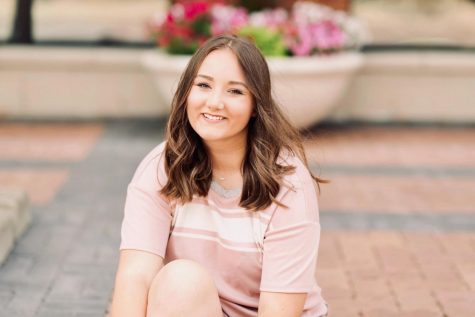
(she/her) Alyssa Skala is a senior at West. She is a third year photographer on staff and a second year editor for yearbook. When she doesn't have her...



